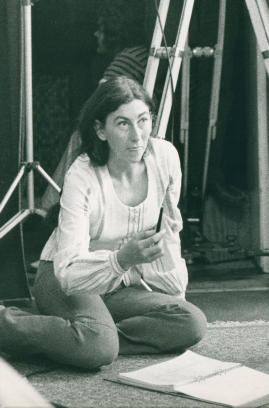Marianne Ahrne
Table of contents
- Basic facts
- Links and resources
- Biography
- Awards
- Films
- Original work
- Soundtrack listing
- Groups
Basic facts
Media (1)
| Film Commissioner | |
|---|---|
| Director |
|
| Show all films | |
| Awards |
|
Biography
Swedish author, director, editor and screenwriter. Born as Siv Marianne Ahrne in Lund. Film Commissioner at the Swedish Film Insitute 2003-2006.-In 1977 Marianne Ahrne made history as the first woman to win a Guldbagge award for Best Director for her film Långt borta och nära ('Near and Far Away'), 13 years after the directing award was launched.She grew up with her grandparents in Falköping, and on leaving school won a scholarship to study in the US, where she started writing poetry and short stories. In 1965 she gained a masters degree from the...
Links and resources
Biography
Swedish author, director, editor and screenwriter. Born as Siv Marianne Ahrne in Lund. Film Commissioner at the Swedish Film Insitute 2003-2006.
-
In 1977 Marianne Ahrne made history as the first woman to win a Guldbagge award for Best Director for her film Långt borta och nära ('Near and Far Away'), 13 years after the directing award was launched.
She grew up with her grandparents in Falköping, and on leaving school won a scholarship to study in the US, where she started writing poetry and short stories. In 1965 she gained a masters degree from the University of Lund, and between 1967 and 1969 she studied directing at the Swedish Film Institute’s Film School.
During her training and shortly thereafter, Ahrne made a number of short and documentary films covering subjects such as dance, Ferai (1970) and Få mig att skratta ('Make Me Laugh,' 1971), and the treatment of old people, Promenade au pays de la vieillesse / Promenad i de gamlas land ('A Walk in the Land of the Old,' 1974), made in collaboration with Simone de Beauvoir. Later she made documentaries such as Kamelresan ('The Camel Journey,' 1989), about her trip to Rajasthan in India to take part in camel racing.
In 1975 her semi-autobiographical film Fem dagar i Falköping ('Five Days in Falköping') was screened in cinemas alongside Stig Björkman’s Den vita väggen ('The White Wall').
Långt borta och nära (1976) was Ahrne’s feature debut. The film centres on Mania, a carer at a mental hospital where she meets a young man who has stopped speaking. For her, the meeting is earth-shattering and a step into the unknown. Widely acclaimed, the film was sold to more than 20 countries.
In 1980 she made her debut as a novelist with "Äppelblom och ruiner" ("Apple Blossoms and Ruins"). The book explores a relationship that Ahrne developed with one of the patients at the Långbro hospital while she was planning and filming Långt borta och nära.
1978 saw the release of The Walls of Freedom (Frihetens murar), a film about an Argentinian actor, Sergio, who comes to Sweden imagining it to be some kind of paradise. He moves in with Karin, a 50 year old woman. In the same house lives Anita, a 30-year-old woman with a 9-year-old daughter. Anita falls in love with Sergio but they cannot connect with each other. The film received a lukewarm reception from the critics, and it took eight years before she released her next feature, A Matter of Life and Death (På liv och död). This work too received an indifferent reception.
In her films, Ahrne often explores problems of contact between men and women, and she is interested in the psychological processes that take place in relationships. In her more recent films her position with regard to men and women and their characteristics has been closely questioned, e.g. in her documentary Plenty of Boys, Shortage of Men? (Gott om pojkar, ont om män?,1995). In this film, Ahrne is in conversation with the psychoanalyst Rigmor Robèrt about men and male roles from a Jungian point of view. Criticism and discussion also followed when Ahrne and Robèrt entered the gender role debate with the follow-up film Girls, Women and Once in a While a Dragon (Flickor, kvinnor - och en och annan drake, 1997).
Ahrne has also directed popular television series such as Flickan vid stenbänken ('The Girl on the Stone Bench,' 1989), based on books by Maria Gripe, and Maskrosbarn ('Dandelion Child,' 1989), which is partly based on the director’s own experiences.
The time she spent as a Film Commissioner at the Swedish Film Institute was marked by a degree of controversy. She was accused of sexism and of denigrating women directors following a remark that "the role of manager can be difficult for women" ("Filmkonst" magazine no. 92).
Marianne Ahrne’s artistic endeavours span a range of different subjects and media. In addition to films and books she has staged theatre plays, and in television and radio programmes she has told of her daring escapades such as running away to Paris as a teenager and paddling down the Mississippi in a rubber raft.
Marika Junström (2014)
(translated by Derek Jones)
Awards
| Prize | Skaraborg | 1987 | (Skaraborgs läns landstings kulturstipendium) | ||
|---|---|---|---|---|---|
| The Guldbagge Award | Stockholm | 1977 | Best Director |

